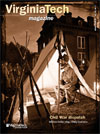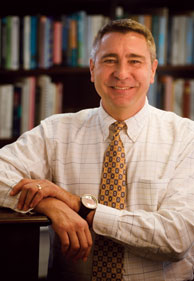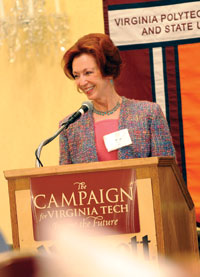 |
|
||||||
|
|
|||||||||||||||||||||||||||||||||||||||||||||||||||||||||||||||||||||||||||||||||||||||||||||||||||||||||||||||||||||||||||||||||||||||
|
Endowing academic flexibility
In 1976, when he created the first professorship endowment in his alma mater's College of Engineering, Charles O. Gordon Sr. (industrial engineering '42) appreciated that the benefits of his generosity would last beyond his lifetime. That fact was driven home in August 2004, when G. Don Taylor became the latest Charles O. Gordon Professor of Industrial Engineering just eight days after Gordon had passed away. Taylor never got to meet his benefactor in person, but the Gordon professorship was an important factor in Taylor's decision to leave the University of Louisville to become the head of Virginia Tech's Grado Department of Industrial and Systems Engineering. Under his leadership, the department has received the highest rankings in its history: U.S. News & World Report ranked the department fourth in the nation in 2010 for both undergraduate and graduate education. Taylor said this success reflects the quality of students and faculty but also was fueled by the generosity of people like Gordon. Taylor is one of many renowned professors in his department, which has five other faculty members with named professorships or fellowships created by donors. Named professorships typically provide faculty members with discretionary money, which gives them the flexibility to explore new initiatives that otherwise would need to be paid for from their department's budget or with conditional funding from an outside agency. "As a department head, having a named position is particularly useful," said Taylor, whose research expertise is in using computer simulations and advanced math to plot optimum trucking routes. "I have a lot of travel demands in order to represent the department and do my job effectively. If I didn't have funding from the professorship, I wouldn't be able to do my job as efficiently." Along with his academic duties, Taylor has helped improve trucking plans used by major transportation companies. He is president-elect of the Institute of Industrial Engineers, the world's leading professional society in that field. Donors who want to ensure that a sizable gift will benefit the university for many decades to come can stipulate that only income from the gift, not the principal, be spent. The Virginia Tech Foundation, which manages money donated to the university, oversees roughly 3,000 endowments created in this manner. According to the foundation's records, the oldest endowments are two scholarships created in the late 1940s, and the first named professorships were endowed in the 1970s. Former Virginia Tech President Paul Torgersen was dean of the College of Engineering in the 1970s and developed a relationship with Gordon, a successful alumnus who would later serve on the Virginia Tech Board of Visitors. Torgersen said he sought Gordon's advice on fundraising for what would become the college's first endowed professorships and wound up with a donation to create one. "Once we got started, there was an incredible momentum," Torgersen said. "But we had to get the first one, and Charles Gordon gave us the first one." Today, a majority of endowments still support scholarships, but many funds have also been set up to benefit particular programs, provide research opportunities for students, bring speakers to campus, or establish professorships like the one used to recruit Taylor. Across the university, plenty of other department heads can cite endowments that help their programs. As Taylor explained, he wanted to come to Blacksburg for many reasons, but the availability of a named position certainly helped cement his decision. "I had a named position at Louisville," Taylor said, "and once you've had the freedom that comes with that, it's hard to give it up."
That September 2010 meeting in a hotel conference room in Greenbelt, Md., was a milestone in the Campaign for Virginia Tech: Invent the Future. With the initial gathering of members of the Washington, D.C.-Maryland Regional Committee—the last of 16 assembled over the past four years to help the university reach its $1 billion campaign goal—a nationwide effort to mobilize the university's supporters was fully under way. "It's Hokies talking to Hokies," said Tyrrell (clothing and textiles '65, M.S. home economics '67), the committee's chairwoman, a few weeks after the meeting. "Regardless of class year, we're bonded. We get reacquainted, we reminisce, and synergy is created. We draw on this synergy to create a piece of Virginia Tech's future." The university's regional committees are based in Florida, California, Texas, New York, and population centers closer to Blacksburg. Regional work is complemented by the efforts of the National Campaign Steering Committee, which has helped drive the campaign since its public launch in October 2007. Prior to that, the Quiet Phase Campaign Steering Committee had helped secure more than $550 million in gifts and commitments between July 2003 (when the fundraising initiative began) and the public launch. By spending countless hours promoting the university and making significant gifts themselves, committee members have fueled much of the campaign's success to date. Combined, the campaign's 907 volunteers donated or pledged more than $265 million between the start of the campaign and mid-October 2010. As a group, they've dedicated more than 10,000 hours to committee events, and that figure doesn't even include time spent contacting friends, colleagues, and fellow alumni. Steve Parker (accounting '83) is a member of the committee focused on the Charlotte, N.C., region. He helped organize and provide seed funding for an endowed fund that Wells Fargo employees are using to pool support for the university. He's also made numerous phone calls and set up meetings with fellow alumni.
"A lot of these folks I don't know personally," Parker said. "But once people understand that I went to Tech and realize what I'm doing by reaching out to them, they're certainly willing to talk."
Albert Raboteau is a writer for University Development.
|
|
||||||||||||||||||||||||||||||||||||||||||||||||||||||||||||||||||||||||||||||||||||||||||||||||||||||||||||||||||||||||||||||||||||||
|
|
|||||||||||||||||||||||||||||||||||||||||||||||||||||||||||||||||||||||||||||||||||||||||||||||||||||||||||||||||||||||||||||||||||||||




